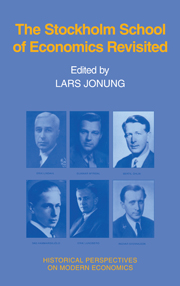Book contents
- Frontmatter
- Dedication
- Contents
- Preface
- List of Contributors
- Dramatis Personae at the end of 1937
- Introduction and Summary
- Part I The roots
- Part II The approach of the Stockholm School
- Part III The impact of the Stockholm School
- Part IV What remains of the Stockholm School?
- The Stockholm School: A non-Swedish bibliography
Preface
Published online by Cambridge University Press: 05 July 2013
- Frontmatter
- Dedication
- Contents
- Preface
- List of Contributors
- Dramatis Personae at the end of 1937
- Introduction and Summary
- Part I The roots
- Part II The approach of the Stockholm School
- Part III The impact of the Stockholm School
- Part IV What remains of the Stockholm School?
- The Stockholm School: A non-Swedish bibliography
Summary
“1937 was a great year for Swedish economics. Erik Lundberg defended his dissertation and Bertil Ohlin made the Stockholm School or Swedish School of economics of the 1930s known internationally through two articles in Economic Journal.” This view was put to me by Kumara Velupillai in the fall of 1986. He continued along the following lines: “The anniversary is coming up next year. Why don't you Swedes celebrate the Stockholm School?” That question was the beginning of this volume.
Actually, Swedes had not celebrated the Swedish School before. There had been no “20, 25, 30, or 40 years after.” The Swedish economics profession has paid surprisingly little attention to its roots. The Stockholm School was no exception to this neglect, although it marks the heyday of Swedish economics. Neither before nor since did the work of Swedish economists attract such international interest. Moreover, there were still a few survivors and close followers of the School who most likely had interesting stories to tell.
The grand old man of Swedish economics, Erik Lundberg, gave me his moral support to organize a conference on “The Stockholm School After 50 Years.” The Marianne and Marcus Wallenberg Foundation generously provided the financial support for the conference that took place at Grand Hotel Saltsjöbaden outside Stockholm on August 31–September 1, 1987.
- Type
- Chapter
- Information
- The Stockholm School of Economics Revisited , pp. xi - xivPublisher: Cambridge University PressPrint publication year: 1991
- 1
- Cited by



